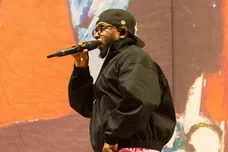Not every rapper possesses the desire nor the skill to be deemed a contender to enter the Best Rapper Alive conversation. Emcees like Lil Wayne and Eminem have, not unlike politicians on the campaign trail, made confident runs declaring their own viability for the position. For Conway The Machine, a figure that cuts a nightmarish cloth across the shattered Buffalo pavement, recognition is a driving force. “I don't think they understand how ill he is,” he raps on "Dough & Domani," as frustrated as he is confident. “I'm really JAY-Z, n**ga, I'm really BIG.”
A cynic might suggest that desire to be named alongside the greats speaks to an overactive ego. An optimist might present the alternative, that only a true scholar of the craft can path their way to professordom. Conway’s respect for hip-hop only becomes clearer with each release. Look no further than his meticulously arranged From King To A God tracklist, which finds him looking to the past for present-day highlights. On “Lemon,” The Machine enlists the maestro of torture himself -- who singlehandedly foreshadowed the gruesome “Gluttony” murder in David Fincher’s Se7en -- Method Man. On the stacked posse cut “Juvenile Hell,” Conway built the entire lineup around the need to capture the spirit of Mobb Deep’s Hell On Earth. The emotionally devastating “Forever Dropping Tears” was brought to life by the combined talents of Erick Sermon and Rockwilder.
Image via Artist
That respect, along with his penchant for weaving detailed tapestries of criminology and the resulting psychological scars, has endeared him to purists. In an arguable contender for verse-of-the-year on "Spurs 3," Conway salutes many of those who stood behind him during his ascension: Sway Calloway, Ebro Darden, Joe Budden, Mal, Wayno, Elliott Wilson, B Dot. Those of a certain age, who connected with the golden era first-hand, can appreciate the sensibilities Conway brings to the table. As a whole, From King To A God feels like a message to those seeking out a great discovery. Those attuned to his back catalog are free to watch from the sidelines with pride while the star player puts on a clinic.
And that he does on From King To A God, his first official album by his own admission. With the arrival of his Shady Records debut looming, this project admittedly feels like a warm-up, albeit one operating at high velocity. There seems to be a willingness to expand his reach beyond the territories he’s come to dominate. It’s part of why songs like the Murda Beatz produced “Anza” stand out as a pleasant surprise. Over an instrumental evocative of a bloodstained Bach fugue, Conway immediately surprises with a slick new flow; comments of his versatility were quick to follow. Between his impeccable verses and a star-confident turn from Armani Caesar, “Anza” did wonders in establishing The Machine’s adaptable presence to a wider audience.
Though sonically different from his preferred instrumental, “Anza” retains that dark aesthetic Conway seems to thrive on. Likewise do highlight cuts like the deranged “Front Lines” and the chilling “Spurs 3,” the musical equivalent of a homicidal wind-up toy. “Lotta albums are suddenly startin' to feel a little more Griselda-esque,” sneers Conway, villainously relishing that final syllable. It’s a triumphant moment masked beneath a spooky veneer, one that firmly cements a key truth: Conway understands the scope of his broader influence, even if the game is still piecing it together.
Facilitating matters are songs like “Forever Dropping Tears,” which features Machine’s most emotive penmanship since “The Cow.” A dedication to two of his fallen friends, including the late DJ Shay, who helped Conway regain his “confidence and stride” following his near-fatal shooting. It's a powerful reflection that showcases a willingness to explore his own inner duality, humanizing a man that might have otherwise appeared unapproachable.
Despite boasting a back catalog to rival most veterans, it’s likely that Conway will only continue to grow, as From King To A God is easily his most complete and polished body of work thus far. For some, the cohesion and pristine production might be disorienting, especially given how grimy and lo-fi his repertoire has been thus far. As a whole, however, the project serves as a culmination of the road-thus far, a meeting point between the twin universes of Shady and Griselda. And at the center sits The Machine, indiscriminately inviting all manner of instrumentals to his chopping block.







